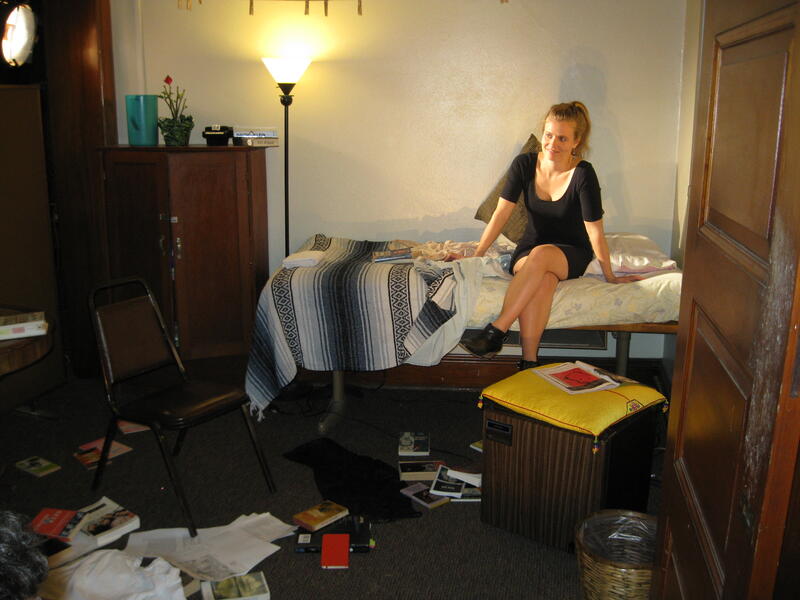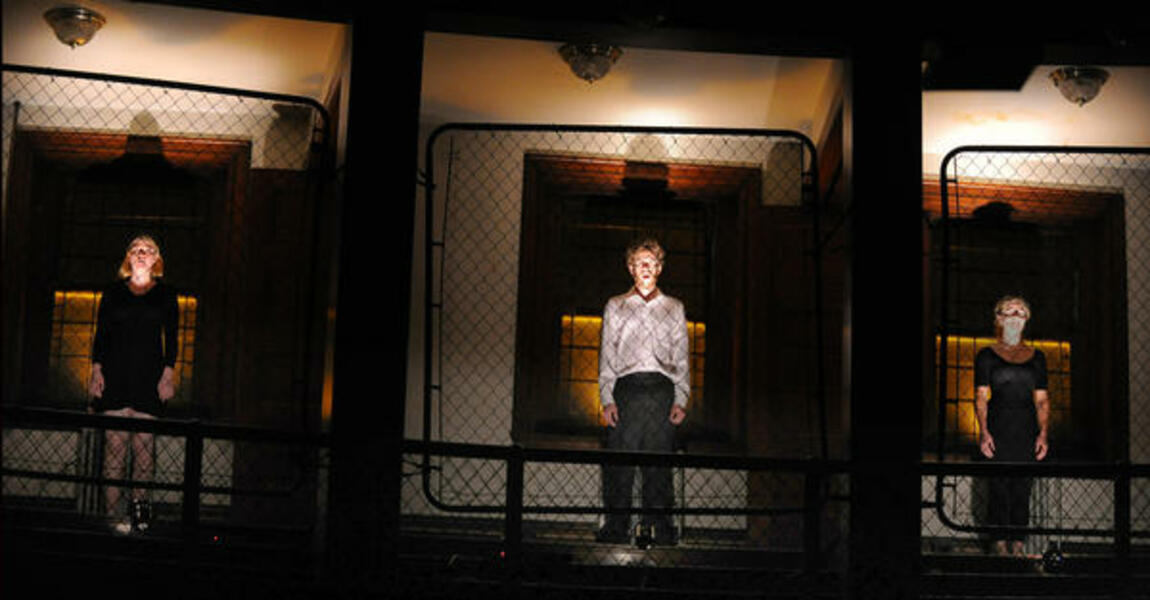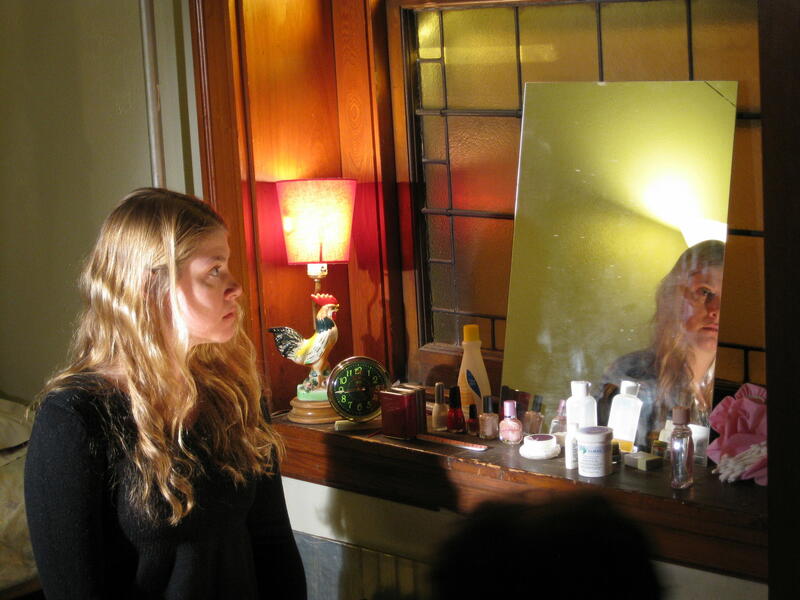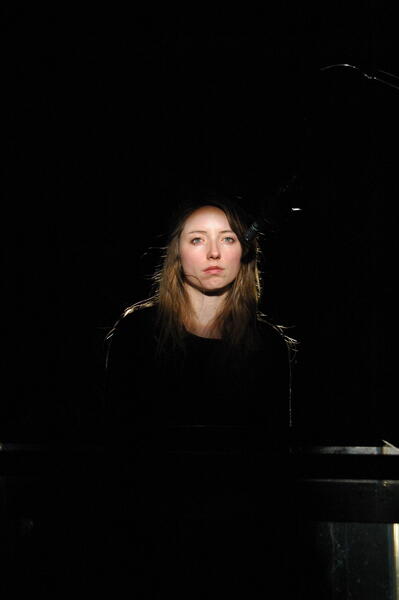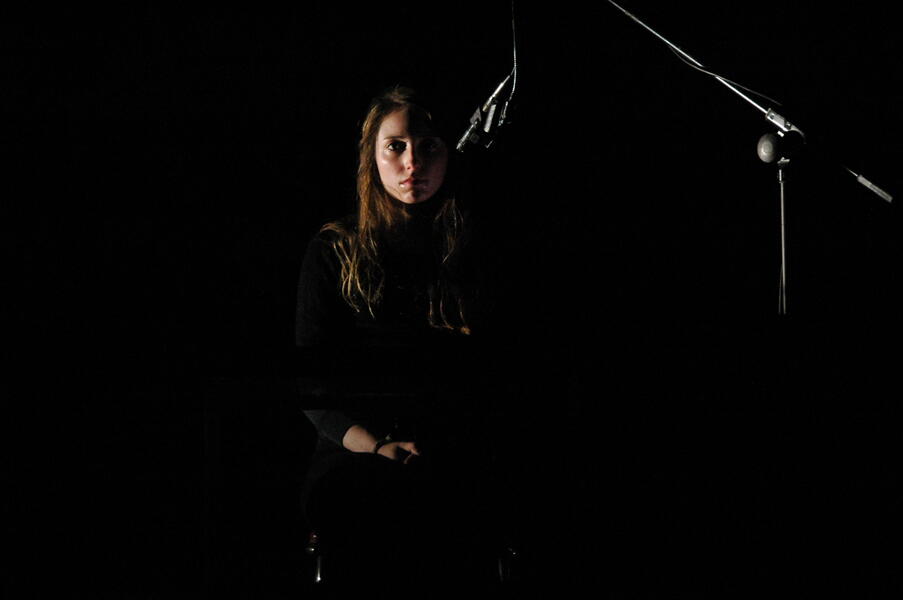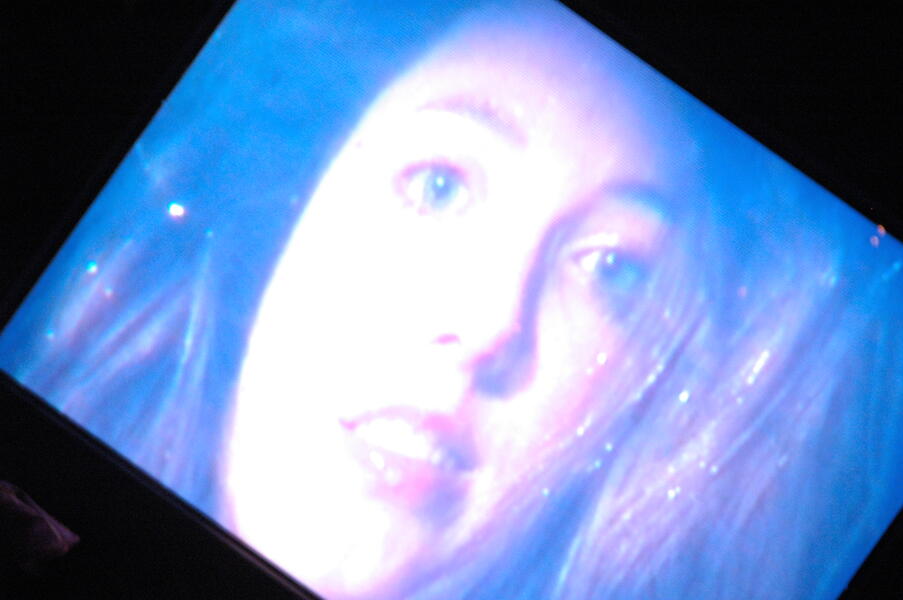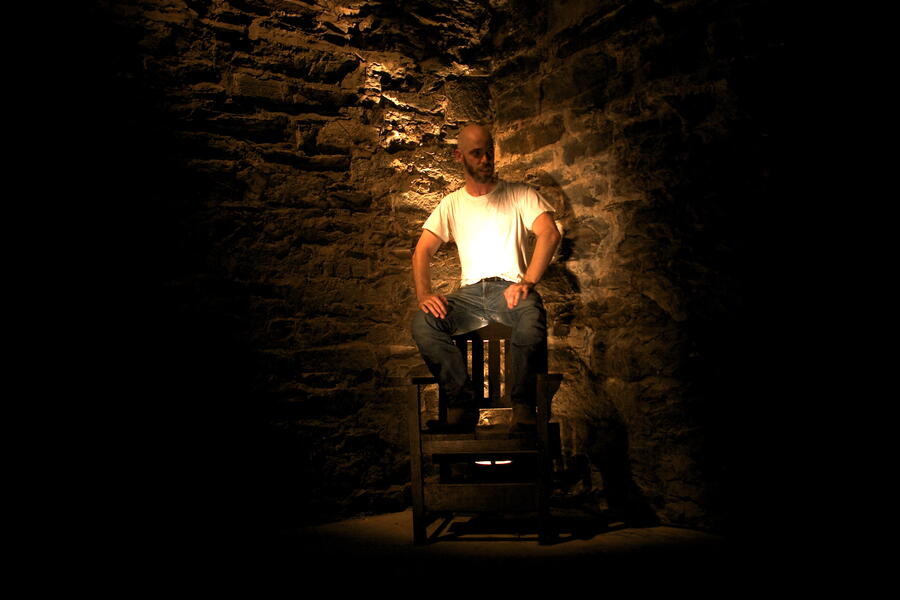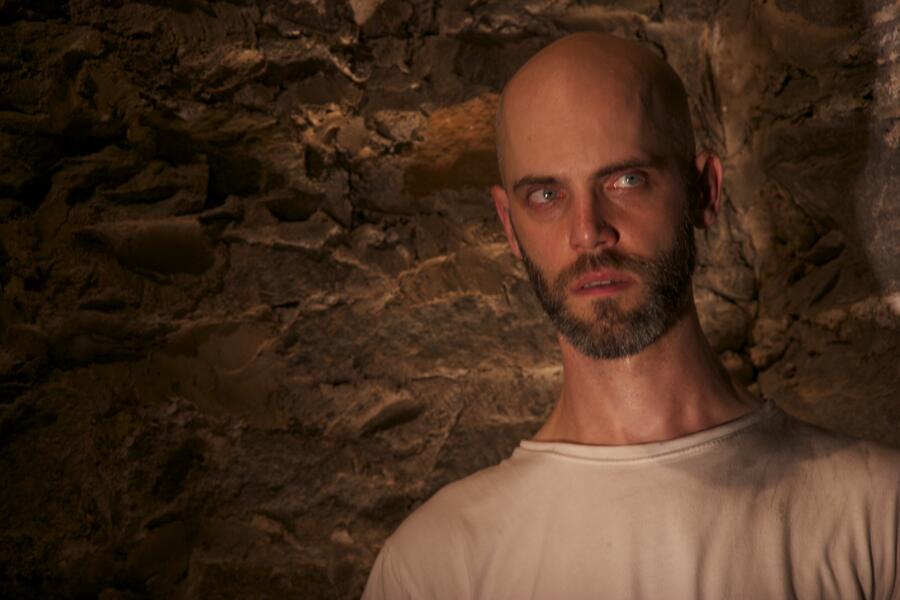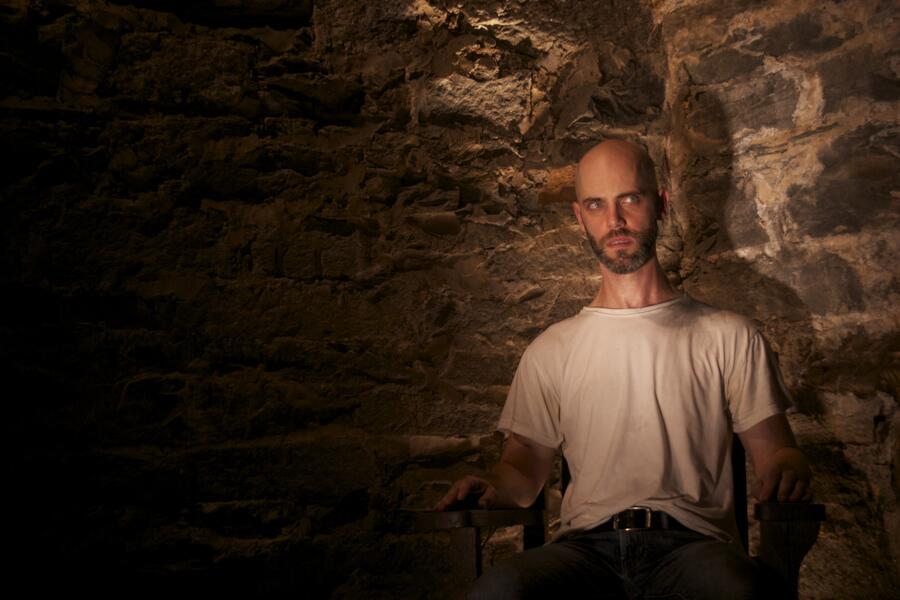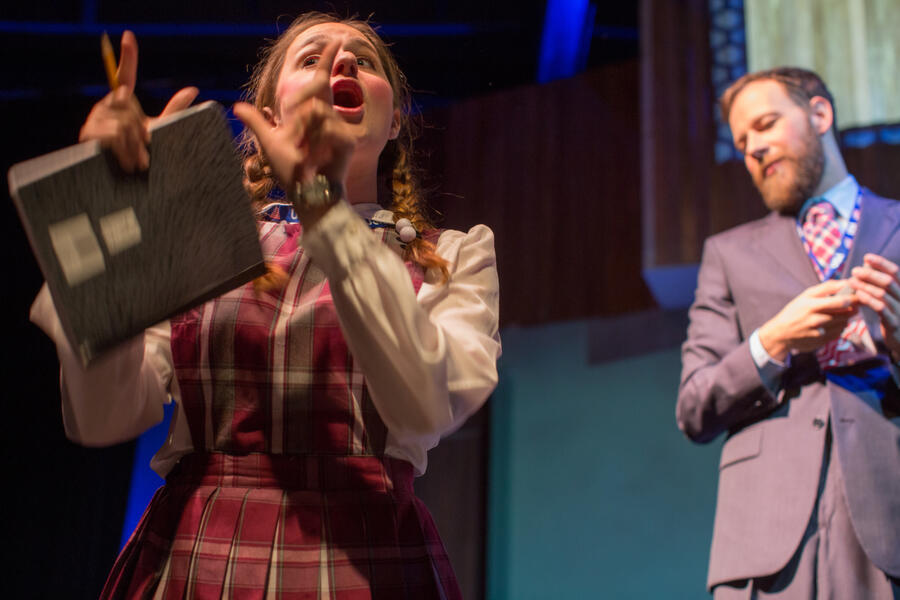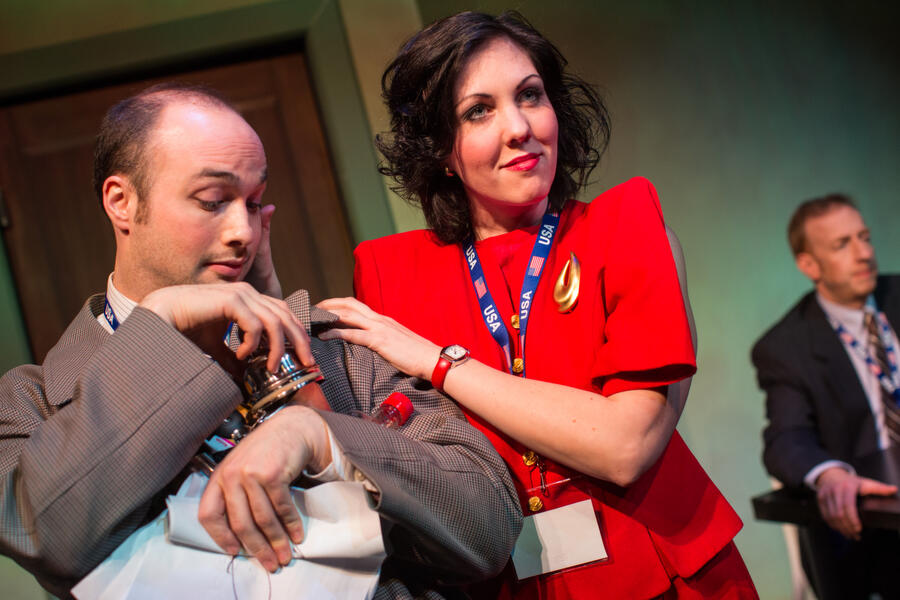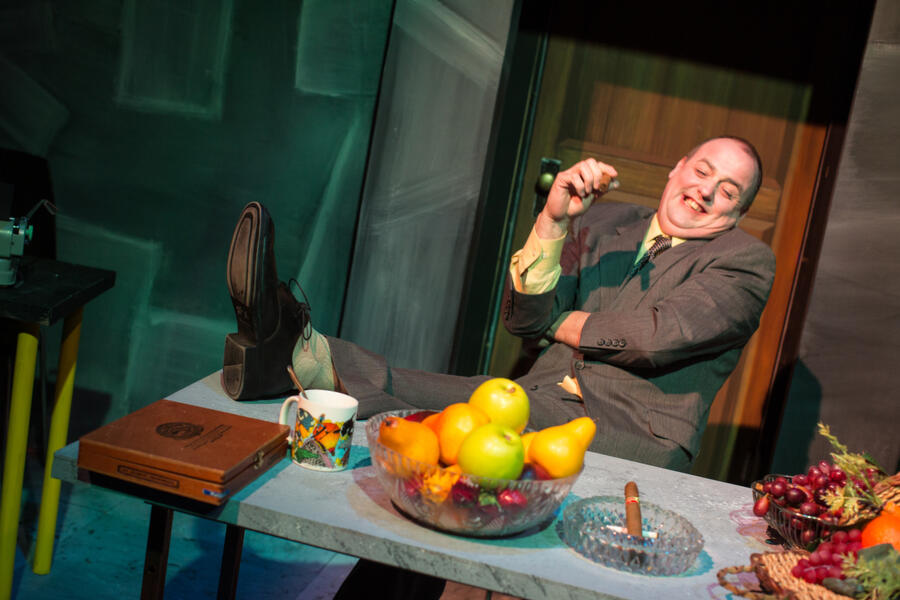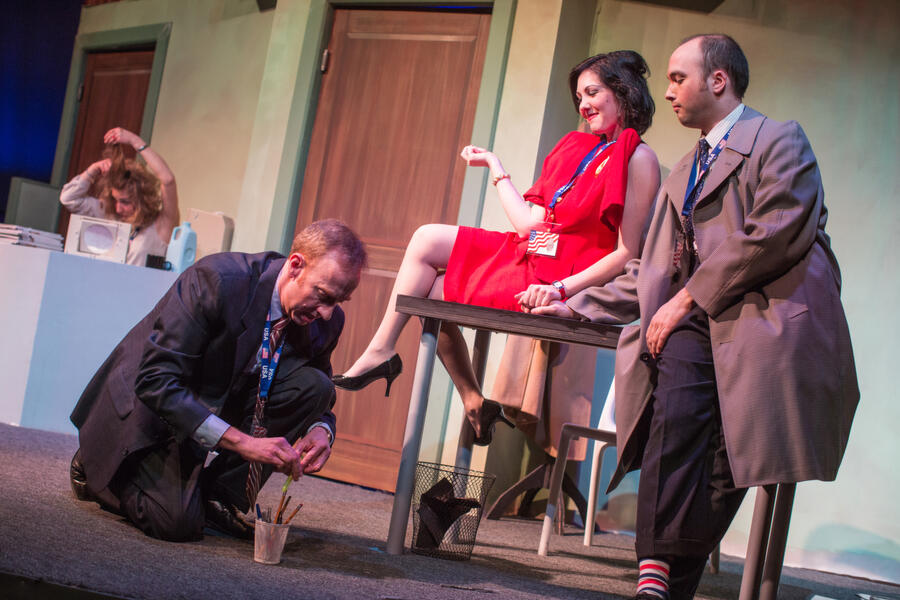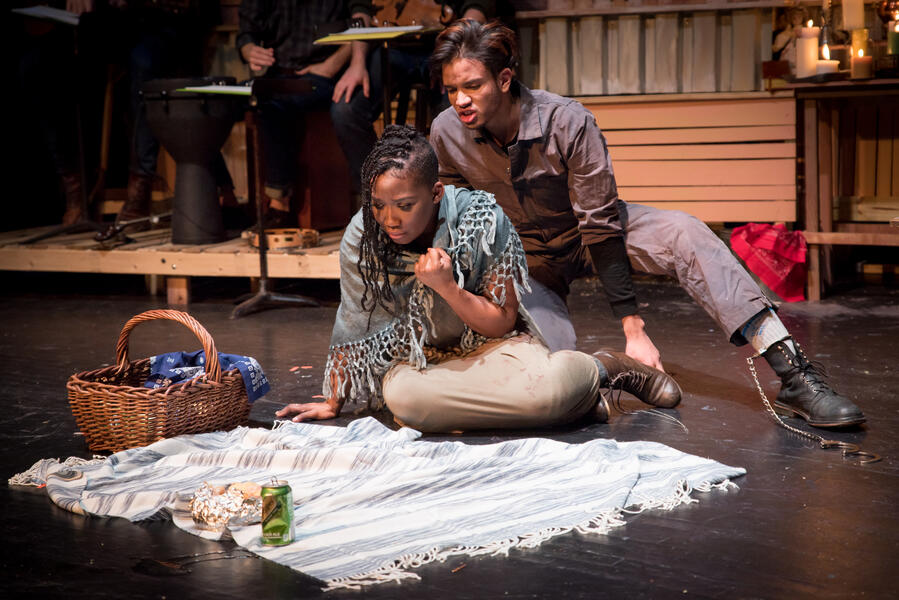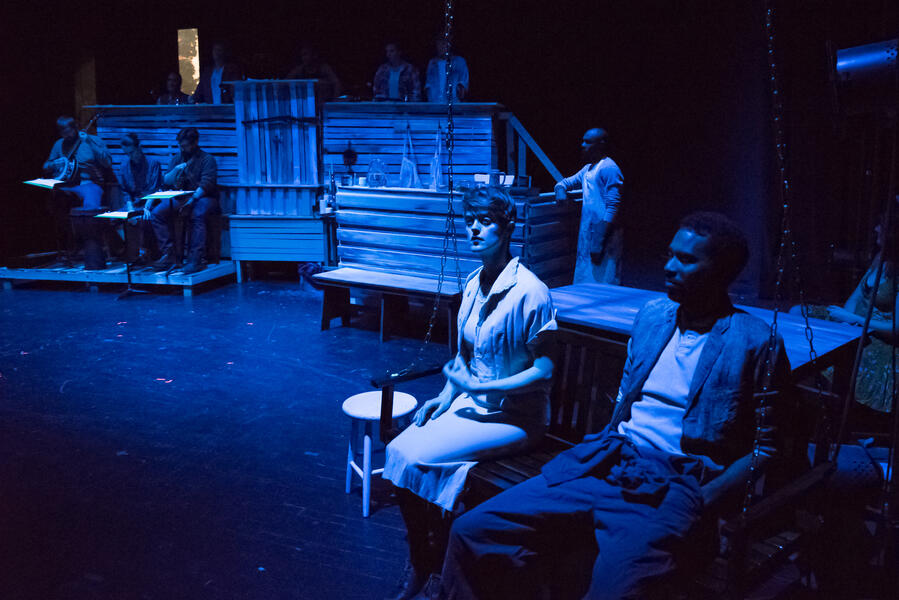About Stephen
Baltimore City

Stephen Nunns is the cofounder of the Baltimore theatre company, The Acme Corporation, where he has co-directed, arranged and adapted, composed music and designed sound for a number of productions, including Follow No Strangers To All The Fun Places (“Best Play – 2018,” Baltimore Magazine) Stranger Kindness (a “misinterpretation” of A Streetcar Named Desire, which received “Best Play – 2017,” from Baltimore City Paper) and the… more
Jump to a project:
Style, Ephemerality, Deterioration and Contingency - a director's approach
For the last two decades, I have explored and questioned the fundamental notions of theatre, pushing the boundaries between art and experience. The idea of liveness—of the living, breathing actor’s presence and their ability to directly commune with an audience—has been at the center of my work as a director and theatre artist.
Of course, anyone involved with live performance deals with this issue, but my focus has been on three specific areas:
-- Style: exploring how a performer can ignite an audience member’s individual cognitive experience that connects with their fundamental connection with reality; offering something deeper than the shallow notion of surface reality that realism—the predominant style in American theatre—proffers. This is a point that I constantly make with actors: Realism is simply a style, one of many that is available to you.
-- Ephemerality: The ephemeral nature of the live event has an obvious attraction to those who work in performance; in the current era when every act can be so easily surveilled, recorded and archived, there is something appealing about art that mirrors our own temporal and temporary existence.
-- Deterioration and contingency: Though these are two separate areas, in my mind they are closely related. I am very interested in the idea of how performance can corrode and weaken over a temporal period offering an opportunity for the unintended experience. (This was best exemplified by the Acme Corporation 24-hour production of Samuel Beckett’s Play.)
Finally, I am interested in challenging the basic notions of what theatre is and can be. Far too often, theatre is equated with literature; our entire structure—which goes back to the Aristotelian hierarchy of tragedy’s elements—is centered on the text. But theatre is not text. Text is simply one experiential element, an element that often has major limitations in conveying thoughts and feelings.
If theatre is to represent or convey an audience member’s conscious experience, it must offer the variety of that experience—which goes far beyond the simple semiotic value of text and language. Language is simply a component of consciousness, one of the many elements of the flow—what William James referred to as “the stream of thought, of consciousness, or of subjective life.”
Of course, anyone involved with live performance deals with this issue, but my focus has been on three specific areas:
-- Style: exploring how a performer can ignite an audience member’s individual cognitive experience that connects with their fundamental connection with reality; offering something deeper than the shallow notion of surface reality that realism—the predominant style in American theatre—proffers. This is a point that I constantly make with actors: Realism is simply a style, one of many that is available to you.
-- Ephemerality: The ephemeral nature of the live event has an obvious attraction to those who work in performance; in the current era when every act can be so easily surveilled, recorded and archived, there is something appealing about art that mirrors our own temporal and temporary existence.
-- Deterioration and contingency: Though these are two separate areas, in my mind they are closely related. I am very interested in the idea of how performance can corrode and weaken over a temporal period offering an opportunity for the unintended experience. (This was best exemplified by the Acme Corporation 24-hour production of Samuel Beckett’s Play.)
Finally, I am interested in challenging the basic notions of what theatre is and can be. Far too often, theatre is equated with literature; our entire structure—which goes back to the Aristotelian hierarchy of tragedy’s elements—is centered on the text. But theatre is not text. Text is simply one experiential element, an element that often has major limitations in conveying thoughts and feelings.
If theatre is to represent or convey an audience member’s conscious experience, it must offer the variety of that experience—which goes far beyond the simple semiotic value of text and language. Language is simply a component of consciousness, one of the many elements of the flow—what William James referred to as “the stream of thought, of consciousness, or of subjective life.”
"Stranger Kindness"
Stranger Kindness was a "misinterpretation" of Tennessee Williams' A Streetcar Named Desire, that I co-adapted, arranged, and directed. Using the intentions and emotions of the original 1951 film adaptation, the piece alternated between a play and a video being live filmed for the audience, and incorporated language from Thornton Wilder's Our Town, various Samuel Beckett plays, and canonical Marxist feminist texts.
"Stranger isn't merely a radical remix of Streetcar; it's an all-out assault on what we talk about when we talk about dramatic naturalism and realism."
-- Bret McCabe, BmoreArt
"Acme offers up probably the most radical and punk rock art thing happening in the city right now. And year, it's faithful to the Williams play in the ways that matter--namely, mood, message and atmosphere."
-- Brandon Soderberg, City Paper
Stranger Kindness was included in the City Paper's "Top Ten Stage Productions of 2016."
"Stranger isn't merely a radical remix of Streetcar; it's an all-out assault on what we talk about when we talk about dramatic naturalism and realism."
-- Bret McCabe, BmoreArt
"Acme offers up probably the most radical and punk rock art thing happening in the city right now. And year, it's faithful to the Williams play in the ways that matter--namely, mood, message and atmosphere."
-- Brandon Soderberg, City Paper
Stranger Kindness was included in the City Paper's "Top Ten Stage Productions of 2016."
"Play"
"Play," which I co-directed, took Samuel Beckett’s stage direction—“repeat play”—at the end of the script literally: the piece ran repeatedly for 12 hours starting at 12 p.m. on March 15, 2013 (concluding at 12 a.m. on March 16), and 24 hours starting at 12 p.m. on March 22 (concluding at 12 p.m. on March 23). Audience members came to performance anytime during the 12- or 24-hour run of the piece.
This was partially an experiment in endurance—I was particularly interested in seeing how the piece would “break down” over an extended period of time. Such temporal concerns are not that uncommon in the world of performance art, but it is not something that one normally encounters in traditional theatrical settings.
“But something else happened in each section, particularly in the monologues: Everything that was "acting" in the performances was burned away, purified. It was the closest I'd ever come to religion in a church.” – Baynard Woods, City Paper
"Play" was recognized as Best Production in the City Paper's Best of Baltimore for 2013 and one of the performers, Sophie Hinderberger, won best actress for 2013 in part for her work in the piece.
This was partially an experiment in endurance—I was particularly interested in seeing how the piece would “break down” over an extended period of time. Such temporal concerns are not that uncommon in the world of performance art, but it is not something that one normally encounters in traditional theatrical settings.
“But something else happened in each section, particularly in the monologues: Everything that was "acting" in the performances was burned away, purified. It was the closest I'd ever come to religion in a church.” – Baynard Woods, City Paper
"Play" was recognized as Best Production in the City Paper's Best of Baltimore for 2013 and one of the performers, Sophie Hinderberger, won best actress for 2013 in part for her work in the piece.
"Not I"
"Not I" by Samuel Beckett, was produced as part of Acme Corporation’s "Rogue Waves"—an evening of short plays in February 2012 at the Bell Foundry.
The presentation of the piece was a radical rethinking of the work. Rather than presenting it in the traditional way—“a stage in darkness but for a mouth . . . faintly lit from close-up and below”—the actress, Sarah Lloyd’s face was totally lit and her voice was amplified by a visible microphone. In front of her was a 50 gallon fish tank filled with water, with a video camera underneath. The text is broken into five sections. At the end of each section, Lloyd put her head in the tank, with her face facing the camera. The image of her face under water was shown on a television screen stage left. While Lloyd held her breath, a singer (Susan Stroupe) sang verses from the traditional Scottish folk ballad "Bonny St. Johnston," one of the “Cruel Mother” songs collected by James Child.
The song, and the violent (and yet oddly peaceful) image of the actress’s face under water underscored the traumatic (and yet unspecific) act that is possibly the reason for the character’s loggerhea.
The presentation of the piece was a radical rethinking of the work. Rather than presenting it in the traditional way—“a stage in darkness but for a mouth . . . faintly lit from close-up and below”—the actress, Sarah Lloyd’s face was totally lit and her voice was amplified by a visible microphone. In front of her was a 50 gallon fish tank filled with water, with a video camera underneath. The text is broken into five sections. At the end of each section, Lloyd put her head in the tank, with her face facing the camera. The image of her face under water was shown on a television screen stage left. While Lloyd held her breath, a singer (Susan Stroupe) sang verses from the traditional Scottish folk ballad "Bonny St. Johnston," one of the “Cruel Mother” songs collected by James Child.
The song, and the violent (and yet oddly peaceful) image of the actress’s face under water underscored the traumatic (and yet unspecific) act that is possibly the reason for the character’s loggerhea.
"Killer's Head"
This Sam Shepard monologue--the last fleeting thoughts of a man about to die in an electric chair--was performed by Chris Ashworth and produced by the Acme Corporation. I staged it in the bell tower of St. Mark's Church, a claustrophobic, stone-encased, dungeon of a room that fit approximately 18 people per performance. Selected by the Baltimore Sun as one of the “Best on Baltimore stages in 2013," Sun reviewer Tim Smith referred to Ashworth's performance as one of "virtuosic nuance and arresting intensity."
"The Good Person of Szechwan"
A reimagining of Bertolt Brecht's classic play, set in present-day Baltimore. As well as directing this project, I composed music for it as well. Lyrics are by Brecht, translated by Tony Kushner. This production was staged at Towson University in April, 2016. (Recordings are from the performance.)
-
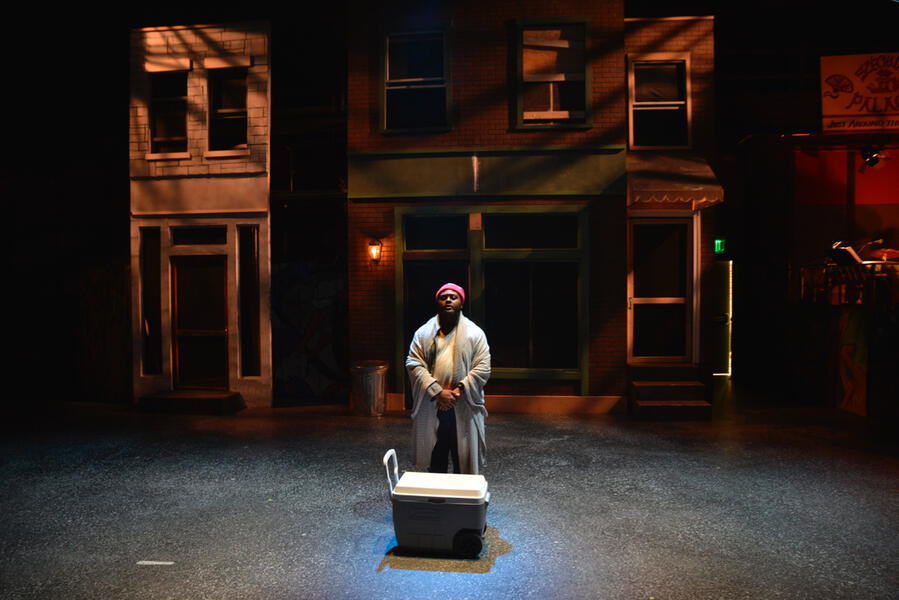 Good Person of SzechwanThe Good Person of Szechwan
Good Person of SzechwanThe Good Person of Szechwan -
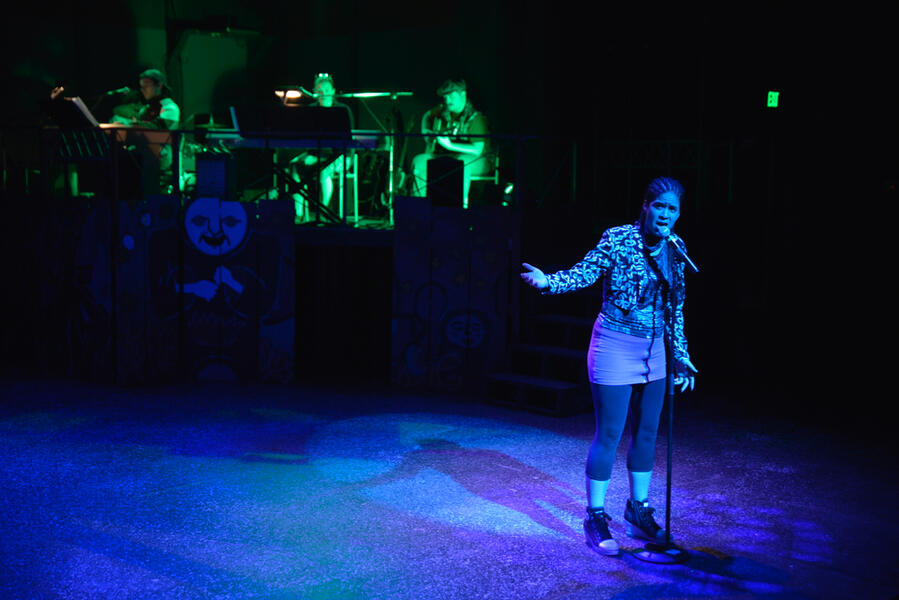 Good Person of Szechwan
Good Person of Szechwan -
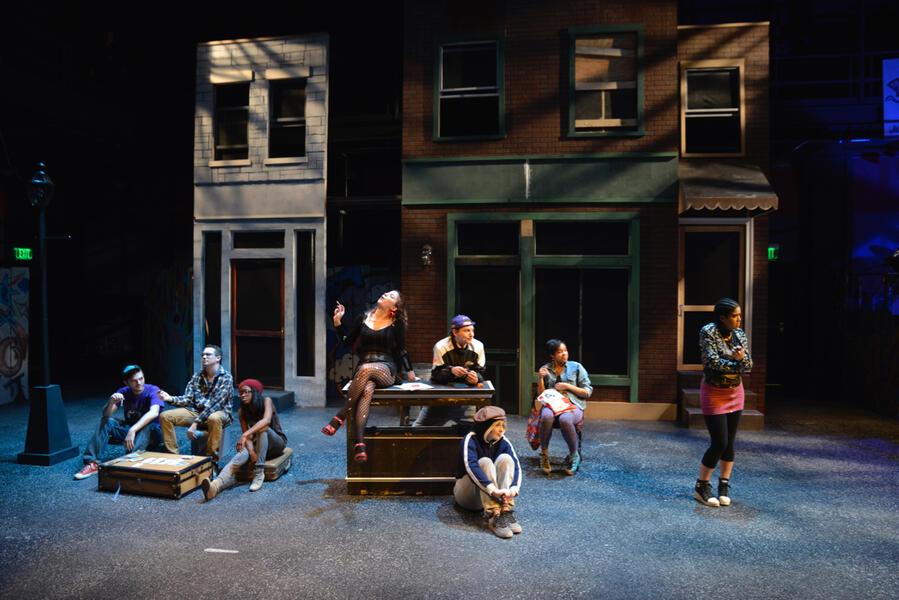 Good Persin of Szechwan
Good Persin of Szechwan -
No video provider was found to handle the given URL. See the documentation for more information.Shen Te Under The Tree (live) by Stephen F. Nunns
-
No video provider was found to handle the given URL. See the documentation for more information.Song Of Eight Elephants (live) by Stephen F. Nunns
-
No video provider was found to handle the given URL. See the documentation for more information.Song Of The Child (live) by Stephen F. Nunns
"The Memo"
Single Carrot Theatre produced “The Memo” in May 2014. The question foremost in my mind while I was directing the piece was how to make Václav Havel’s critique of Communist Party bureaucracy and conformity in the mid-sixties relevant to a contemporary audience. Upon reflection, it became apparent that 50 years after the first production of “The Memo” and 25 years after the fall of the Berlin Wall, the Soviet Union and its satellites didn’t have the corner on top-heavy bureaucracies. Anyone who’s gone to the Maryland DMV knows that.
“With The Memo, Single Carrot manages to balance its tendency toward avant garde, progressive theater with excellent acting and staging, resulting in one of the best local productions this year.” – Evan Serpick, City Paper
“The Memo” was awarded “Best Revival” for the City Paper’s Best of Baltimore 2014.
“With The Memo, Single Carrot manages to balance its tendency toward avant garde, progressive theater with excellent acting and staging, resulting in one of the best local productions this year.” – Evan Serpick, City Paper
“The Memo” was awarded “Best Revival” for the City Paper’s Best of Baltimore 2014.
"Fucking A"
This version of Suzan-Lori Parks' dark riff on The Scarlet Letter, which I directed for Iron Crow Theatre in 2017, was set in a truly American universe--part-Cracker Barrel, part-Deliverance. The recent election forced me and my collaborators to realize that Parks' play, written in 2000 as a description of a dystopian time ahead, could easily be an outline of our not-so-distant future featuring the subjugation of the working class, minorities, and women.
“Looming over the stage is a long, tall judge's bench of sorts, where members of the ensemble cast sit and watch over the action below, at times translating the "talk," a strange language used by female characters when discussing women's matters (abortion, for example, is "die Aba-nazip"). No one leaves the stage; all cast members remain visible in the sidelines observing the transgressions unfolding in front of them, dimly lit by a shrine-like stack of flickering, misshapen candles that bleed pink light into the twilight blue cast over the stage. The color is so potent that it might take you a while to realize the entire floor is splattered with blood.”
- Maura Callahan, City Paper
“Looming over the stage is a long, tall judge's bench of sorts, where members of the ensemble cast sit and watch over the action below, at times translating the "talk," a strange language used by female characters when discussing women's matters (abortion, for example, is "die Aba-nazip"). No one leaves the stage; all cast members remain visible in the sidelines observing the transgressions unfolding in front of them, dimly lit by a shrine-like stack of flickering, misshapen candles that bleed pink light into the twilight blue cast over the stage. The color is so potent that it might take you a while to realize the entire floor is splattered with blood.”
- Maura Callahan, City Paper
